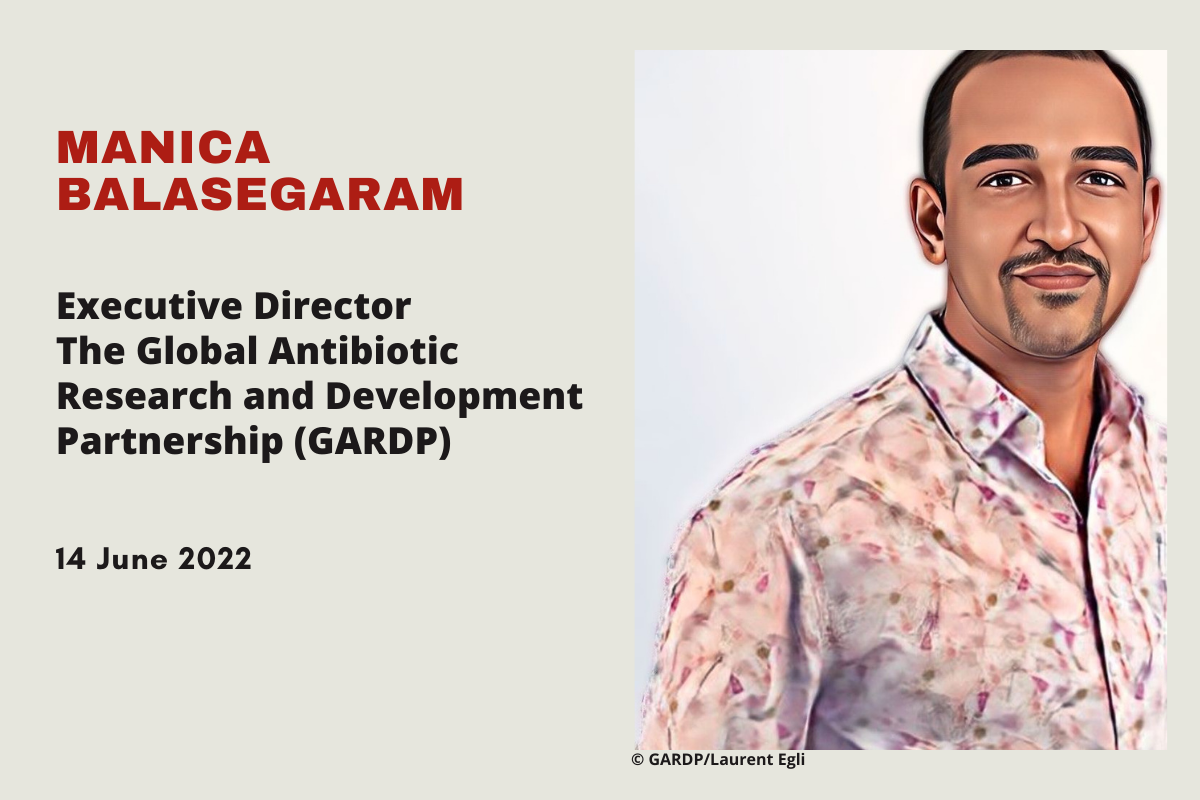The Interview | Manica Balasegaram
 |
How would you present your organization in a few words? What is your role? What is your goal? |
The Global Antibiotic Research and Development Partnership (GARDP) is a not-for-profit organization based in Geneva and has a global presence. Our organization was created to address the growing threat of antibiotic resistance, as bacteria have increasingly become resistant to many commonly used antibiotics. This is causing the deaths of nearly 1.3 million people a year and is taking a heavy toll on health systems across countries. We focus on developing new and improved antibiotics to treat a range of health problems, from infections acquired in hospitals and bloodstream infections in newborn babies to sexually transmitted infections. We also aim to speed up access to antibiotics to people wherever they need them, around the world. Our objective is to deliver five new treatments by 2025 to tackle the drug-resistant infections that pose the greatest threat to global health. We work with partners in the public and private sector to achieve our goals.
I’ve helped to build the organization from its conception through to its operations. My personal life objective is to contribute to something that will have a positive impact on society. I think each of us can play a role in helping to solve different problems that we face as a society, and being involved in public health is the way I believe I can contribute the most.
 |
Among the concentration of actors in Geneva (IOs, NGOs, permanent missions, academia, and the private sector), who do you work with and how? |
We work with a wide variety of actors, from governments who fund us to other foundations and nonprofit organizations. We work with academic institutions on research, including on clinical trials, and partner with innovative companies to develop technologies. In Geneva, our main partner is the World Health Organization (WHO), which was a key founder of GARDP, together with the Drugs for Neglected Diseases initiative (DNDi). Other Swiss-based stakeholders collaborate with GARDP, including the Foundation for Innovative New Diagnostics (FIND); Sandoz, the Novartis generics division; BioVersys AG; and the European Society of Clinical Microbiology and Infectious Diseases (ESCMID). These stakeholders demonstrate the wide range of expertise and support that Swiss public and private actors can provide in tackling the growing pandemic of antimicrobial resistance.
We have close contacts with the permanent missions in Geneva They play an important role in making governments aware of the value of our work.
We work in different ways with our partners, but with good teamwork and a common vision to develop life-saving treatments for drug-resistant infections.
 |
What are the strengths and weaknesses of Geneva with regards to the development of your activity? |
Geneva is a unique and special hub for global health. In this challenging world in which we live, we need this calm and safe space where people can come together, discuss, negotiate and agree on common ground for action. Geneva has much to offer the world in this way.
We are proud to have chosen Geneva as our base. We are also very pleased that the Republic and Canton of Geneva is helping to fund our development of a novel antibiotic for the treatment of gonorrhoea, a rapidly increasing sexually transmitted infection with 87 million new infections worldwide every year. We are grateful to the Swiss Federal Office of Public Health (FOPH) for helping to support GARDP financially since its inception in 2016.
We’d be encouraged to see Geneva become even more engaged in our work on antimicrobial resistance (AMR), which is fast becoming one of the major issues in global health. AMR is a classic example of an issue with international dimensions that we would like to see championed by International Geneva and Switzerland.
We’d also encourage private foundations and institutions in Switzerland to support our work to develop antibiotic treatments that could transform and save lives.
 |
|
Health is an issue par excellence in building bridges between countries. It’s one of those spheres that even governments that are relatively antagonistic towards each other, can work on together. I’d like to see more focus being placed on using health as a bridge to build strong relationships and cooperation between countries. Health can be a valuable way of strengthening global governance as well as international cooperation and diplomacy in the decades to come.
 |
|
It would have been interesting to ask how I see the relationship between Switzerland as a country and Geneva as a global health hub. What does the average person in Geneva and in other cities and the countryside in Switzerland, think about International Geneva and global health? I think there’s an opportunity to find ways to boost the awareness of the work being done in global health in Geneva among the people of Switzerland. It could be a great opportunity to connect and learn for all of us.
